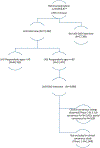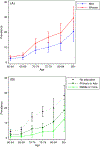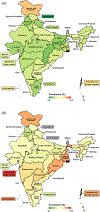Prevalence of dementia in India: National and state estimates from a nationwide study
- PMID: 36637034
- PMCID: PMC10338640
- DOI: 10.1002/alz.12928
Prevalence of dementia in India: National and state estimates from a nationwide study
Erratum in
-
Correction to "Prevalence of dementia in India: National and state estimates from a nationwide study".Alzheimers Dement. 2025 Jul;21(7):e70555. doi: 10.1002/alz.70555. Alzheimers Dement. 2025. PMID: 40693452 Free PMC article. No abstract available.
Abstract
Introduction: Prior estimates of dementia prevalence in India were based on samples from selected communities, inadequately representing the national and state populations.
Methods: From the Longitudinal Aging Study in India (LASI) we recruited a sample of adults ages 60+ and administered a rich battery of neuropsychological tests and an informant interview in 2018 through 2020. We obtained a clinical consensus rating of dementia status for a subsample (N = 2528), fitted a logistic model for dementia status on this subsample, and then imputed dementia status for all other LASI respondents aged 60+ (N = 28,949).
Results: The estimated dementia prevalence for adults ages 60+ in India is 7.4%, with significant age and education gradients, sex and urban/rural differences, and cross-state variation.
Discussion: An estimated 8.8 million Indians older than 60 years have dementia. The burden of dementia cases is unevenly distributed across states and subpopulations and may therefore require different levels of local planning and support.
Highlights: The estimated dementia prevalence for adults ages 60+ in India is 7.4%. About 8.8 million Indians older than 60 years live with dementia. Dementia is more prevalent among females than males and in rural than urban areas. Significant cross-state variation exists in dementia prevalence.
Keywords: Alzheimer's disease and related dementia; Clinical Dementia Rating; cognitive impairment; dementia prevalence; major neurocognitive disorder.
© 2023 The Authors. Alzheimer's & Dementia published by Wiley Periodicals LLC on behalf of Alzheimer's Association.
Conflict of interest statement
CONFLICTS OF INTEREST
All authors declare that they have no conflicts of interest. Author disclosures are available in the supporting information.
Figures



References
-
- United Nations, Department of Economic and Social Affairs, Population Division. World Population Prospects 2022: Summary of Results. UN DESA/POP/2022/TR/NO.3. New York: United Nations, New York; 2022. Accessed September 3, 2020. https://www.un.org/development/desa/pd/content/World-Population-Prospect...
-
- International Institute for Population Sciences (IIPS), NPHCE, MoHFW, Harvard T.H. Chan School of Public Health (HSPH), and the University of Southern California (USC). Longitudinal Ageing Study in India (LASI) Wave 1, 2017-18, India Report. International Institute for Population Sciences; 2020.
-
- United Nations, Department of Economic and Social Affairs, Population Division. World Population Prospects 2019 United Nations; 2020. Accessed September 3, 2020. https://population.un.org/wpp/DataQuery/
-
- Kumar CTS, Shaji KS, Varghese M, Nair MKC, eds. Cochin, India: Dementia in India 2020. Alzheimer’s and Related Disorders Society of India (ARDSI), Cochin Chapter; 2019.

